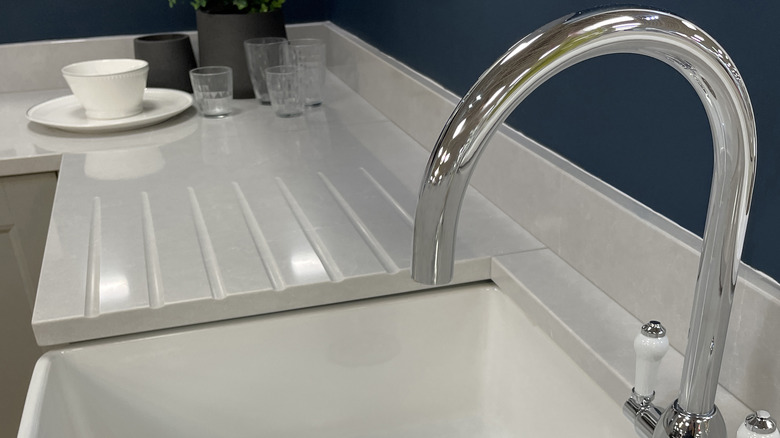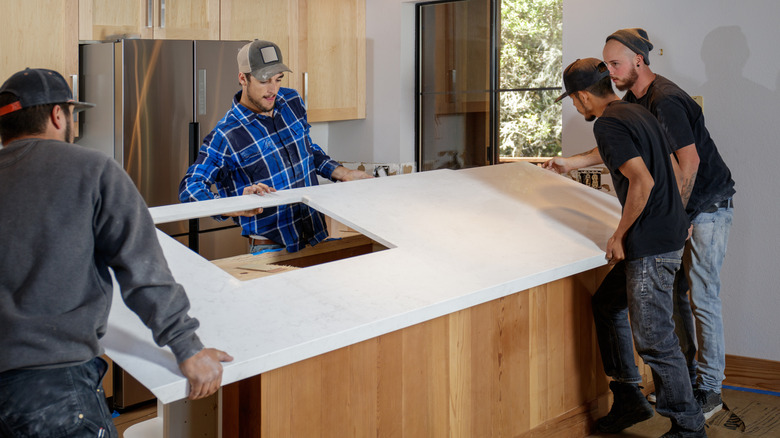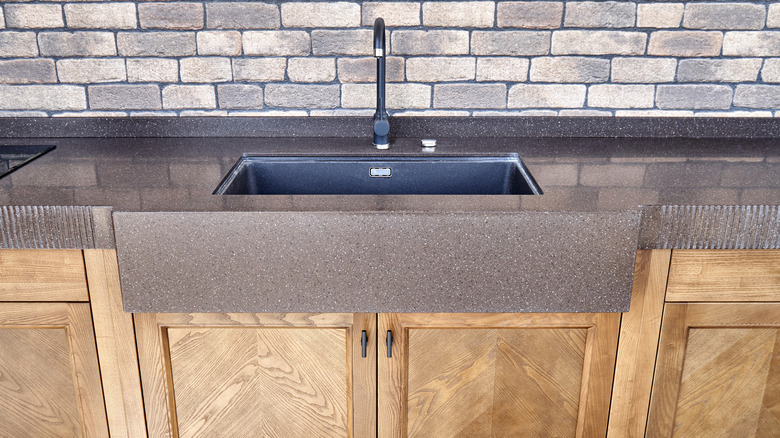How Much It Could Cost To Install Corian Countertops In Your Home
The investment in new countertops for your kitchen requires careful consideration of numerous factors. Color, material quality, durability, and even how easily they can hold up to all the sauce splashes and spilled drinks are essential factors to consider. Yet, beyond all of this, your kitchen renovation has to be within your budget. If you're thinking about Corian countertops for your home, you may be surprised by how much more affordable they are now.
Some countertop materials that are more affordable than others, including porcelain, limestone, and laminates, but don't overlook the value Corian brings to the table as well. Corian is not an actual material, but rather a brand name for a type of solid surface substance that contains natural minerals and polymers. It may give off the look and feel of quartz, but it's often far less expensive because it incorporates manmade materials within it, not just heavily quarried, rare, and hard-to-find quartz.
The cost to install Corian countertops in your home will range widely based on location, size, type, and overall product selection. Expect to pay in the range of $2,200 and $5,000 in most applications. A price-per-square-foot range of as low as $24 and as high as $84 can be expected based on what you select. The much lower price compared to other countertop materials is one of the reasons so many people seek it out, but there are a few other factors to keep in mind before you assume this is the product to go with for your kitchen.
Corian isn't the only solid surface countertop option
Corian is a type of solid surface countertop, originally designed by DuPont in 1967 and patented for many years after. During that time, if you wanted to purchase a solid surface, the only option was Corian, and costs were typically higher. The makers set out to create a material that looked, felt like, and offered many of the benefits of granite and quartz but was a fraction of the cost. The product took off and became a popular choice for many kitchens in the U.S. because of the aesthetic it offered at a fraction of the cost.
Then, the patent expired. That meant that other manufacturers could enter the game and offer products that were very similar or even the same as name-brand Corian. Some other manufacturers today include Porcelanosa, HI-MACs, and Avonite. Because there was more competition, that helped to keep the price even lower over time. These products offer many of the same benefits, including excellent aesthetics and thermoforming to allow for a more flexible design that could have features like curved edges and a wide range of color options.
Today, you can even purchase DIY Corian-style countertops. As you explore the various types of countertops to consider, it's easy to see that options like granite and marble are not going to be DIY projects. Corian, on the other hand, can be, and that can keep costs lower.
What factors influence Corian pricing?
The cost of installing Corian countertops in your home will vary somewhat from one area to the next simply due to the cost of living. However, these products are also available in a wide range of styles and with numerous features. For example, Corian options may include beautiful metallic elements to give the look of natural stone like granite. You will find others that offer a much larger variety of colors and patterns. Look for those that have various degrees of translucency, patterns that include veining like natural stone, and those with bright and bold finishes, all of which can impact the overall price of the products.
Another key factor in determining the cost of Corian is how thick it is. Corian is available in various sheets with widths ranging from 6mm to 19mm. You can expect to pay more for the added durability that comes from a thicker slab of the material. Note that most countertops are at least 12.3 mm thick.
Corian can also be flexible in its design, but the more customization and fabrication involved, the higher the cost. For example, they can be created with integrated sink basins and accessories, creating a seamless transition from your sink to your counter. You can have them molded to fit specific features or choose those with engraving or perforations that allow you to create quite detailed designs and patterns. Though not all products offer the same flexibility, it's important to think about just how customized you want this space to be.


